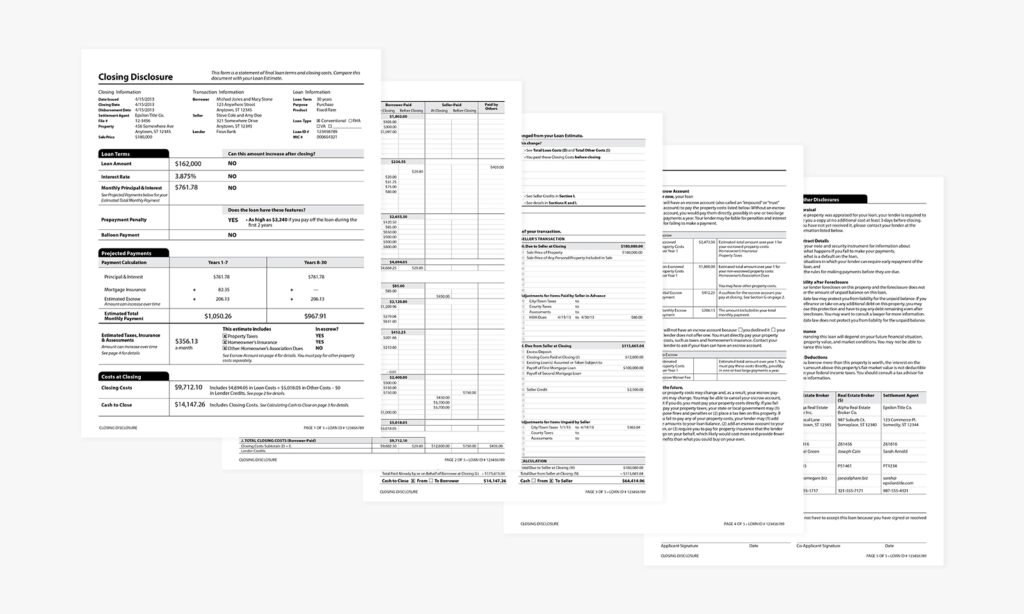

How to do Bookkeeping for Real Estate Investments
In this article I outline the different pieces you’ll want to record when bookkeeping your real estate investments. The first section summarizes what you’ll need to do when you purchase your investment, while the latter part of this article covers what to do with different types of investments.
For example, if you’re
- wholesaling, you’ll have a few write-offs such as mileage, subscriptions, and office expenses
- house flippers will want to approach their accounting similar to a construction company by tracking their direct and indirect costs, as well as the accuracy of their estimates
- income property deals will have several transactions that will need to be allocated on a monthly basis along with capital improvements
At the Time of Purchase
Fortunately, everything you need is listed on the Closing Disclosure Statement when you purchase or sell a piece of real estate.

The most common entries will be
- Earnest Money
- Down Payment
- Property’s Value
- Tenant Security Deposits*
- Closing Costs
- Mortgage
The major categories you’ll be concerned with are assets, liabilities, and expenses.
If you’re using QuickBooks there are a few things you’ll need in place before you can record your transaction. Our guide, QuickBooks Setup for Real Estate Investors, covers these details.
You’ll want to have an asset account designated for the piece of real estate you’re purchasing, a liability account for the loan, and a few things set up that allow you to record your direct costs if you’re doing a flip. Depending on your accounting software this may be something already available to you. Otherwise, you may need to customize your software.
Aside from this, you’ll want to make sure to record any purchase-related expenses, such as an appraisal and inspection.
Earnest Money
Earnest money might feel like an expense because it’s leaving your bank account, but on paper, it’s considered an asset because it’s going towards the property you’re buying. You’re exchanging cash for a piece of real estate.
Down Payment
Like earnest money, the down payment is also recorded as an asset in the same manner. This helps you track the cash you put towards the purchase of the real estate.
So far, you should have two items recorded as an asset against your property asset account.
Real Estate and Debt
The next step will be to record the value of the real estate at the time of purchase minus the earnest money and down payment. Then you’ll simultaneously record the loan as a liability.
Security Deposits and More
If the property has security deposits from tenants these should be placed in a separate bank account and listed on your books as an asset. You’ll also want to track the monthly interest that accumulates from each tenant’s security deposit.
The interest would be recorded both as an asset and an expense on paper. Then you would also have schedules created for the depreciation of real estate, loan amortization, security deposit interest, capitalized expenses, real estate taxes, and more depending on the transaction.
Most of these transactions would be recorded on paper, meaning they wouldn’t affect your bank account. This is what allows you to decrease your tax liabilities at the end of the year.

Investment Strategies that Need Bookkeeping
Wholesaling
In wholesaling, you don’t have real estate expenses, but you do have costs related to finding deals for others.
Out of the different real estate activities wholesaling is probably the easiest one to do bookkeeping. Wholesalers really just have income and expenses to record.
Income = Assignment Fee
Expenses
- Subscriptions for finding deals, such as Propstream
- Advertising
- Supplies
The use of your car isn’t an expense unless you have another primary vehicle, but you could track the mileage you put on each year so you can take advantage of the mileage deduction.
Housing Flipping
A remodeler will want to track the remodeling costs similar to how a construction company does, but with the exception of using a different set of accounts.
Instead of using the cost of goods sold accounts, a remodeler will use an inventory account associated with the property they’re renovating. The reason an inventory account is used is that in the accounting world a flip can’t claim the costs as expenses until the property is sold.
A remodeler will also want to track their estimated costs against their actual costs. That way they can determine what adjustments they may need to make on their next remodel to avoid overages and risk losing money on the deal.
In order to have an accurate estimated versus actual report, you’ll want to make sure your items are mapped to the correct accounts in your accounting software. This is highlighted further in our QuickBooks Setup for Real Estate Investors Guide
BRRRR (Buy, Rehab, Rent, Refinance, Repeat)
I purposely wanted to cover BRRRR after house flipping because there’s one key difference. This is whether you know ahead of time if the flip will become a rental or a sale.
If it really is a BRRRR, I would assume the intention is to rent out the property after you remodel it. You could write off the costs of construction now since you don’t plan to sell it. But if there’s even an inkling you might end up selling the property, you may want to do your bookkeeping in the same manner as a flip until the project is complete.
Even if you don’t plan to sell the property there’s really no harm in recording the construction costs in the same manner as a flip. It might actually be a good idea to do so since claiming the expenses this month versus a few months from now isn’t going to hurt anything. If you do end up renting out the property all it would take is a simple journal entry to move the costs out of inventory and into expenses.
Income Property Bookkeeping
Income Property is essentially a small business. You’ll have income, which is rent, which may also include parking, storage, and laundry equipment use.
For expenses, there will be several items you can allocate over the course of the year, such as
- Insurance
- Real Estate Taxes
- Capital Improvements
Real Estate Syndication
If you have a Real Estate Syndication your bookkeeping is fairly straightforward.
Your income might include
Acquisition Fee1 – 3% of the Purchase PriceAsset Management Fee1 – 2% of Gross IncomeRefinance Fee1 – 2% of the Refnainced Loan AmountDisposition Fee1 – 3% of the Sale PriceLoan Guarantor Fee1 – 2% of the LaonTYPICAL REAL ESTATE SYNDICATION FEESExpenses may only include office-related costs and advertising.
Whatever your investment strategy, this should be a good starting point for you.



Comments (1)
Eric,
You came out of the foggy mist swinging.
3-blogs today!
On point, explained in plan language, and I can feel your heart in your writing.
I just subscribed to your blog.
Janet Behm, over 2 years ago